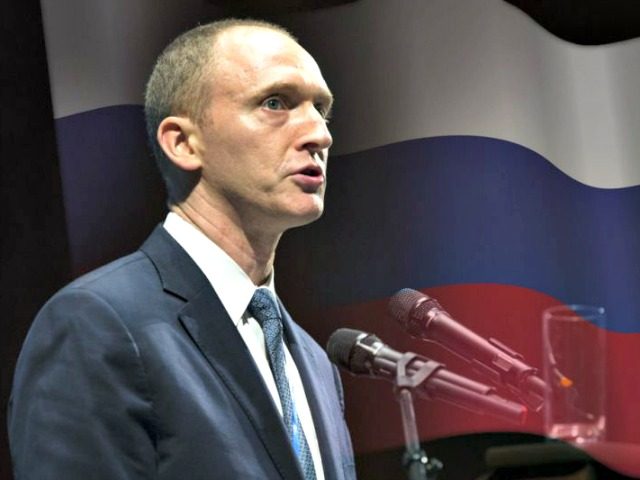The Department of Justice on Saturday released documents detailing the surveillance of Trump campaign adviser Carter Page pertaining to FBI’s investigation into collusion between the Trump campaign and Russia.
The heavily redacted 412-page document includes the agency’s initial October 2016 Foreign Intelligence Surveillance Act (FISA) warrant application to surveil Page, along with three renewal applications filed in January, April, and June of 2017.
Several news organizations, including CNN, The New York Times, The Guardian, and The Hill received copies of the FISA documents by filing Freedom of Information Act lawsuits. The application states the FBI had believed Page “has been the subject of targeted recruitment by the Russian government,” and was “collaborating and conspiring with the Russian government.”
The FISA application cites evidence in the Steele dossier, believed to have been compiled by former British intelligence agent Christopher Steele, that Page engaged in “clandestine intelligence activities,” on behalf of a foreign power and “influence activities,” pertaining to the 2016 election.
“That section cites information from “Source #1,” who alleged that during a trip to Moscow in July 2016, Page met secretly with two sanctioned Kremlin insiders, Igor Sechin and Igor Diveykin, as part of a collusion scheme involving the Trump campaign,” reports The DCNF’s Chuck Ross.
Reacting to the document’s contents, Page — who was not charged for his so-called spying activities — told Ross he is “[H]aving trouble finding any small bit of this document that rises above completely ignorance and/or insanity.”
“Even more shocking than the civil rights abuses inherent in today’s initial FISA abuse documents and its testament to @Comey & Co’s very poor “legal” judgment is the complete ignorance it shows regarding Russia,” Page tweeted following the release.
Following a May meeting between President Trump, Deputy Attorney General Rod Rosenstein, and FBI Director Christopher Wray, Inspector General Michael Horowitz investigated possible abuses in the Justice Department’s surveillance activities during the 2016 presidential election. “If anyone did infiltrate or surveil participants in a presidential campaign for inappropriate purposes, we need to know about it and take appropriate action,” Rosenstein said in a statament.
After the FISA documents were published, President Donald Trump criticized special counsel Robert Mueller’s investigation of possible collusion between the Trump campaign and Russia. “The Rigged Witch Hunt, headed by the 13 Angry Democrats (and now 4 more have been added, one who worked directly for Obama W.H.), seems intent on damaging the Republican Party’s chances in the November Election” President Trump tweeted. “This Democrat excuse for losing the ‘16 Election never ends!”
The Rigged Witch Hunt, headed by the 13 Angry Democrats (and now 4 more have been added, one who worked directly for Obama W.H.), seems intent on damaging the Republican Party’s chances in the November Election. This Democrat excuse for losing the ‘16 Election never ends!
— Donald J. Trump (@realDonaldTrump) July 21, 2018
“No Collusion, No Obstruction – but that doesn’t matter because the 13 Angry Democrats, who are only after Republicans and totally protecting Democrats, want this Witch Hunt to drag out to the November Election,” he added. “Republicans better get smart fast and expose what they are doing!”
No Collusion, No Obstruction – but that doesn’t matter because the 13 Angry Democrats, who are only after Republicans and totally protecting Democrats, want this Witch Hunt to drag out to the November Election. Republicans better get smart fast and expose what they are doing!
— Donald J. Trump (@realDonaldTrump) July 21, 2018
A Carter adviser told The New York Post‘s Paul Sperry that he believes the FBI’s surveillance — thought to have been in part conducted by foreign policy expert Stefan Halper — was driven by the agency’s anti-Trump bias. Sperry reported:
Page believes the FBI’s mole, professor Stefan Halper, was secretly spying on him as part of a “politically motivated” investigation of Team Trump, using fake sympathy to gain his trust — all while fishing for dirt on Page’s ties to Russia, where he’d worked as an energy consultant. I wouldn’t be surprised if it turned out to be a trap.
Page reportedly first met Halper after the oil consultant gave a presentation at the “2016’s Race to Change the World,” security conference, organized by the University of Cambridge’s Centre for Research in the Arts, Social Sciences and Humanities. Halper later asked Page multiple times to meet at his Virginia farm. Curiously, the informant contacted Page on July 28th, 2017 — months after Donald Trump entered the White House — according to an email that the consultant tweeted on May 20. In the email, the suspected FBI informant suggested the media had shifted its attention from the Trump-Russia collusion narrative to palace intrigue inside the White House.
MORE: DOJ announces indictment of 12 twelve Russian nationals "for committing federal crimes that were intended to interfere with the 2016 U.S. presidential election." https://t.co/BHK5srongc pic.twitter.com/Y3Wsodgoid
— ABC News (@ABC) July 13, 2018
The release of the FISA documents come after the Justice Department indicted 12 Russian intelligence officers for “hacking offenses” during the 2016 presidential election. The Kremlin-linked hackers are accused of infiltrating the computer systems of the Democratic National Committee and Hillary Clinton’s failed presidential campaign, leading up to the election.

COMMENTS
Please let us know if you're having issues with commenting.